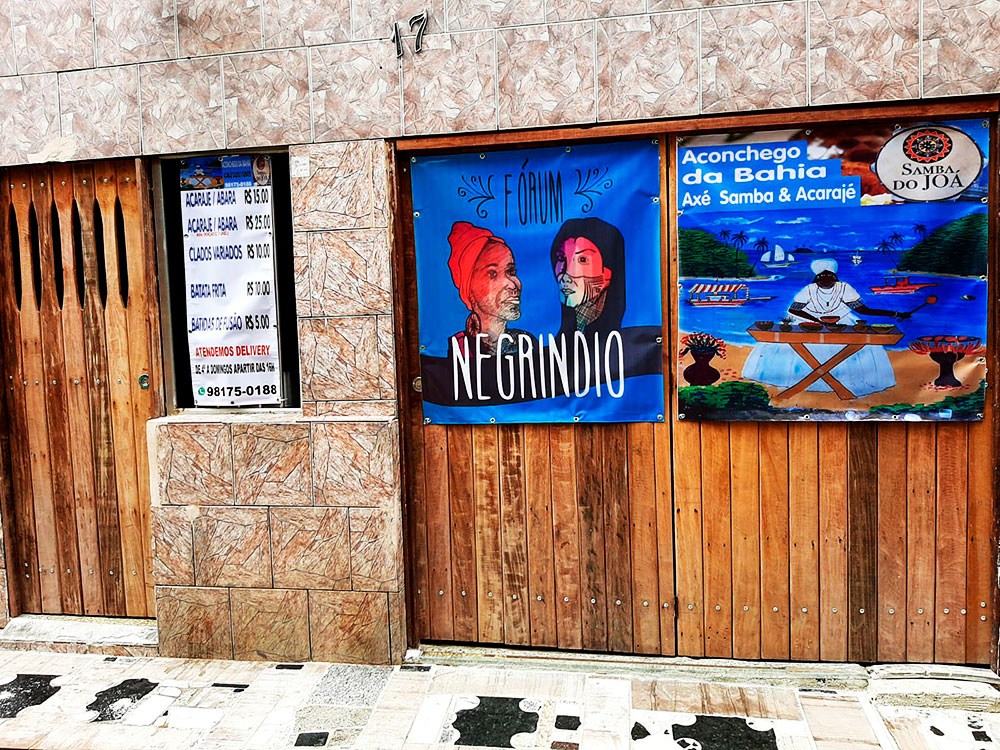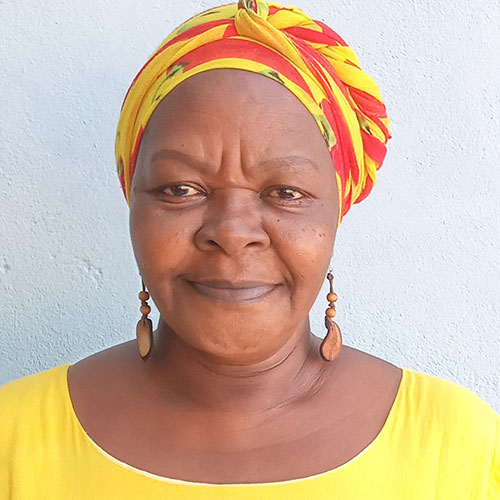Conversation Circle with Acarajé – Samba do Joá
“Roda de Conversa com Acarajé – Samba do Joá” is a project that carries out activities and cultural events throughout the year on themed dates, in Quebra Mar, Barra da Tijuca.


In addition to a lot of Samba and Acarajé, the event organises the Negrindia Fair and cultural presentations such as Jongo, Capoeira and other activities and attractions linked to Afro and indigenous cultures. Visitors, in addition to being able to taste delicacies from Bahia such as Acarajé and Abará, can also refresh themselves with several drinks, hot or cold, that cannot be missed, including Água de Coco and even take an invigorating dip in the sea. From now on, the invitation is made.
The “Roda de Conversa com Acarajé – Samba do Joá” (Conversation Circle with Acarajé – Samba do Joá) aims to praise popular culture and is also an act of resistance. The “Samba do Joá” is a project of Circuito de Samba Carioca.
Israel Evangelista, known within the Black Movement as Ofarerê, is the founder of the project. He holds the position of Ogã initiated at Casa de Oxum Maré, located in Salvador-Bahia, where he was born. He is a cultural producer, activist of the social movement CONEN – National Coordination of Black Entities and coordinator of the Afro Religious Movement Ofarerê RJ.
Since August 2003 living in Rio de Janeiro, Ofarerê came at the invitation of Yalorixá Edelzuita de Oxaguian to contribute to the institution she presides over, INAOSSTECAB- National Institute, and the Supreme Priestly Organ of the Afro-Brazilian Tradition.
A little bit of the trajectory of Israel Ofarerê Evangelista
In March 2004, he participated in the First Walk to Combat Religious Intolerance, held in Copacabana, after achieving the goal of creating the National Day to Combat Religious Intolerance, which is celebrated on January 21 and was instituted in Salvador by councilwoman Olívia Santana and made official in 2007.
The date was chosen because on that day, a disrespect was committed against the Priestess Mãe Gilda de Ogum (deceased in 2000), who in 1988 founded the Terreiro de Candomblé Ilê Axé Abassá de Ogum, located in Lagoa de Abaeté in Salvador/Bahia. According to the website Calendarr Brasil , she died as a result of physical and verbal aggression, as well as attacks on her house and terreiro, configuring Religious Intolerance, in addition to being accused of charlatanism by adherents of another religion through a publication in a newspaper.
In 2012, Ofarerê was invited to celebrate the Centenary of Priestess Ìyá Regina de Bomgbosé (Bomboxé) of Iemanjá, who died in 2009. The celebration was a procession starting at Posto Dois, a kiosk in Oxumarê, to Quebra Mar, on Avenida do Pepê, Barra da Tijuca, Rio de Janeiro. This celebration took place four days after an image of Iemanjá, which the fishermen had in that locality, was destroyed, and the possibility of an act of Religious Intolerance was not ruled out, according to the website O Globo Eu-Repórter .
There was started a battle to gain respect for the signs and symbols of the African Matrices.. The topic was debated during the procession and, in the following years, in March, the event Presente de Iemanjá – Xirê de Iemanjá began in the locality, with Ofarerê, the Associação dos Pescadores Livres and the Amigos da Barra of Tijuca and surroundings.
In 2015, Ofarere received the Local Actions Award, Rio450 Edition from the Municipal Department of Culture of the City of Rio de Janeiro. With the money raised, an 750 kilos concrete image of a mermaid was made and placed, where the image of Iemanjá, which was destroyed, used to be.
This image was consecrated by a group of renowned priestesses from the city of Rio de Janeiro, such as: Mãe Beata de Iemanjá (now deceased) accompanied by some of the Ogãs from her house, Ilê Omiojuaro, Mãe Francis de Iemanjá, Mãe Mimi de Nanã , Mãe Almerinda de Oxum, Ebomy Miracema de Oxum, Ekedi Ivete de Iemanjá and by Ogã Ofarerê himself.
Aluísio Pica Pau was as well present, local fisherman and President of the Praia dos Amores Fishermen’s Association, who gave all the support to implement the idea, and to hold the event. At the time, the event was recognised as a symbol of resistance in that locality, Barra da Tijuca, and as a manifestation of Afro Popular Culture.
That same year, the project “Roda de Conversa com Acarajé- Samba do Joá” (Conversation Circle with Acarajé – Samba do Joá) held a cultural event with the Bahian Afro fair and cuisine to hold the Presente de Iemanjá event. And so, the project was born, the result of the Gift of Iemanjá.
In October 2019, “Samba do Joá” became part of the Carioca Samba Circles Calendar and was considered fit by the Rio de Janeiro city hall to carry out the Samba Entrepreneurship Circuit. Ofarerê organised a fair with 30 exhibitors and held a two-hour presentation followed by cultural expression and demonstration, and thus the project received authorization to sell, permanently, the Quitutes of Bahia, having as reference the Acarajé, the Abará and its rich spices.
How is the project Conversation Circle with Acarajé – Samba do Joá maintained?
Ofarerê explains that the project continues with the Acarajé Board, set up next to the image of the Sereia, in the Quebra Mar in Barra da Tijuca. According to Ofarerê, during the pandemic, external events were suspended and the project “Roda de Conversa e Acarajé – Samba do Joá” (Conversation Circle with Acarajé – Samba do Joá) received contributions from the exhibitors of Feira Negrindia and partnered with the Delivery trade “Aconchego da Bahia”, a space located on Rua da Chácara, 17, Tijuquinha, Estrada da Barra da Tijuca, and with that the Tabuleiro do Acarajé continued working at full steam with delivery. The same space also serves as the project’s headquarters, where meetings take place.
Below is the 2022 agenda. All events are accompanied by Feira Negrindia, Cultura Afro Indígena:
June 27th and 28th, Samba das Viúvas;
25th and 26th of July, Anniversary of APELABATA – Association of Free Fishermen and Friends of Barra da Tijuca and Surroundings of Barra da Tijuca;
August Recess;
September 19th and 20th, Samba da Primavera;
October 10th and 11th, Samba dos Erês and goes on;
-Tabuleiro do Acarajá, daily at Quebra Mar da Barra da Tijuca starting at 11:00 am and going until the dough runs out;
-Delivery Aconchego da Bahia, from Wednesday to Sunday, from 16:00
More actions
“In March 2020, we were preparing to hold the Salão Arte Naif de Portas Abertas, which, at the invitation of artist Jorge de Olinda, came from São Paulo to paint a baiana de acarajé on one of the pilasters, and the others would be painted by other artists representing urban culture such as: graffiti artists, the Hip Hop crowd and others.
With the Pandemic, this action became unfeasible, and, on the other hand, the artist could not make the return trip, so we spent two months painting the 22 pilasters of Joá, with themes focused on the locality, for the religious issue of Iemanjá and other popular manifestations.”, says Ofarerê.
Another point he brings up is that indigenous and African communities need support so that they can be multipliers of actions and management within their institutions, and thus be able to compete on equal terms with the public notices issued by government agencies and others. Samba da Consciência then participated in the Forum Negrindio Rumo a Década Afrodescendant where the Canoas Group was present. Canoas is a consultancy group for social projects that pays attention to public notices aimed at traditional peoples, promoting access to these people, projects and institutions that help maintain the culture and tradition of a people.
For more information about the events, contact Ofarerê in the channels below. Exhibitors are welcome, the more diversity the better.
All are also invited to enjoy the Naif art displayed on the pilasters of Joá RJ.
E-mail: ofarere@gmail.com



